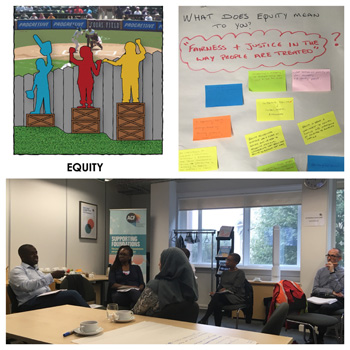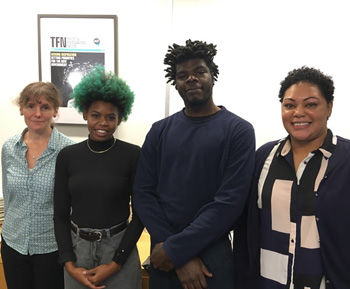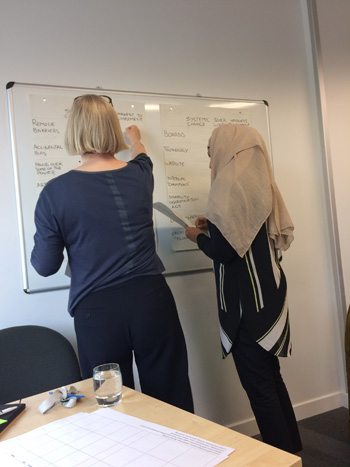Diversity, equity and inclusion
The Diversity, Equity and Inclusion working group was one of the six underpinning the
Stronger Foundations initiative.
The group's principal purpose was to examine, discuss and debate challenging questions about foundation practice related to its theme.
The
final report is available, following the group's work, snapshots of each meeting to date, including content, reading materials and outputs.
The group's work contributed significantly to the raw material gathered through the initiative as a whole, from which ACF have created a variety of products, including the 'Pillars of Stronger Foundation Practice' report, which also summarises the breadth of discussions and evidence gathered.
The group was comprised of senior foundation representatives drawn from across ACF's membership, who met seven times over an 18 month period. The meetings, which varied in format depending on the topic and desired content, included presentation of evidence (by experts from within and beyond the foundation sector), small group discussions, whole group exercises and visits.
The group's full terms of reference is available to view and download.
The members of the group were:
Denise Ramsey, UnLtd (group chair); Habiba Nabatu, Lankelly Chase Foundation; Debbie Pippard, Barrow Cadbury Trust; James Fitzpatrick, Joseph Levy Foundation; Samia Khatun, Hilden Charitable Trust; Julianna Bell, Migration Foundation; Melanie Griffiths, Cloudesley; Jonathan Freeman, Caretech Foundation; Fozia Irfan, Wakefield & Tetley Trust (& ACF board member); Nick Perks, Joseph Rowntree Charitable Trust; Sharon Shea, Esmée Fairbairn Foundation; Anisa Easterbrook, Stars Foundation.
Meeting Snapshots
Meeting #1 (May 2018) - introduction meeting
In May, we were delighted to hold the first working group meeting, chaired by Denise Ramsey, director of awards at UnLtd. The group wished to be bold, collaborative, positive, curious and challenging. It discussed what equality and diversity (the initial name for the group) meant to the members of the group, in both a personal and professional context.
This scene-setting exercise became an exchange on some of the issues facing the sector – such as representation, legitimacy, and power. Terminology was also considered key to the group’s work, and members felt that ‘equality and diversity’ as a group name did not sufficiently reflect leading practice. 'Diversity, Equity and Inclusion' (DEI), terms that are central to discussions elsewhere in the voluntary sector and among foundations internationally, was proposed.
The group aims to focus upon issues that include: how foundations form their strategies with a DEI lens; how foundations can use data to challenge practice and adapt strategy; staff recruitment and board diversity; and developing networks with diversity experts and communities that face inequality while being mindful of tokenism.
In terms of new grantees, the group is keen to look at how we remove barriers (e.g. reduce risk threshold, simplify forms, look at the language we use) and how foundations can support leadership development and capacity.
Blog: "Why We Need to Stop Talking About Equality!", a Stronger Foundations 'provocation', written by working group member and ACF trustee, Fozia Irfan.
Meeting #2 (July 2018) - Data-driven change
The second meeting of the working group focusing on diversity, equity and inclusion, examined the benefits and risks of data-driven change. The group took evidence from the co-founder of Equileap, whose ‘Gender Equality Global Report & Ranking’ aims “to make the gender performance of public companies transparent and comparable, and to enable corporations to understand how they can improve performance”.
Its reporting on the top performing 200 global companies attracted significant media attention. Companies are changing their practices in order to be in the list next year, while those doing well are using the data in marketing. It has even contributed to new legislative requirements in some jurisdictions. In the UK, since 2017, a new law mandates that “any organisation that has 250 or more employees must publish and report specific figures about their gender pay gap”.
The group also heard from the Marcus Bell, Director of the Cabinet Office’s Race Disparity Unit, and Jeremy Crook, CEO of the Black Training and Enterprise Group who serves on its advisory board. The Unit has used data from across government to identify race-based disparities in terms of service provision and outcomes. It mandates that all government departments must ‘explain’ these disparities or ‘change’ policy and practice accordingly.
Presentations:
Speaker snapshots:
Marcus Bell (director of the Cabinet Office Race Disparity Unit) and Jeremy Crook (CEO of Black Training Enterprise Group, and member of the Downing Street Race Disparity Advisory Board)
Meeting #3 (September 2018) - Equity in Action
 The third working group meeting looked at equity in action. The group discussed its various interpretations of equity, which centred on recognising that people have different and unequal starting points, and that there are important differences between a focus on outcomes and opportunities.
The third working group meeting looked at equity in action. The group discussed its various interpretations of equity, which centred on recognising that people have different and unequal starting points, and that there are important differences between a focus on outcomes and opportunities.
Group member Fozia Irfan shared lessons from her recent research into how US foundations are putting equity into action. Fozia gave examples of lessons that UK foundations could take into consideration, and explored how the history of race relations in the USA has led to a distinct social and political context to that in which we operate. This means putting equity in action in the UK carries its own set of challenges. The group analysed some of these challenges, as well as the advantages and reasons behind taking an equity approach, and ultimately, who does andshould be involved in strategic and grant-making decisions.
The group also heard from Stephen Bediako, chair of The Social Innovation Partnership and secretariat for the Diversity Forum, which aims to enable social investment to be more diverse, equitable and inclusive in its decision-making. Stephen encouraged foundations to adopt the Diversity Forum’s Manifesto actions as a starting point:
1. We will commit to diversity in our team at a staff and governance level.
2. We will commit to exploring approaches and methods that help to bring equality, diversity and inclusion in how investment decisions are made in the social investment space across the UK.
3. We will commit to exploring new mechanisms to support organisations to become more diverse across the UK.
4. We will commit to finding ways to encourage social investments to support the full range of diverse recipients and issues we have in the UK.
Blog: "Trusts and foundations have a diversity deficit. Is it time for regulation to fix it?", a Stronger Foundations 'provocation', written by working group member James Fitzpatrick
Meeting #4 (November 2018) - Implementing an inclusion approach in grant-making
In its fourth meeting, the group focused on how foundations can take an inclusive approach to grant-making.
There are many ways that foundations can deliver inclusive practice as an explicit aspect of their strategy, and there are a variety of examples of good practice in the UK and elsewhere.
Some relate to the composition of staff and boards (such as actively recruiting from the communities that the foundation supports), while others involve working with the community to design the criteria for grant programmes, or to identify what support is required.
 Members examined a case study presented by staff involved with Islington Giving, a pooled fund supported by several ACF members. Islington Giving awarded over £1million in grants in 2016 thanks to the contributions of residents, businesses and funders, administered and hosted by Cripplegate Foundation.
Members examined a case study presented by staff involved with Islington Giving, a pooled fund supported by several ACF members. Islington Giving awarded over £1million in grants in 2016 thanks to the contributions of residents, businesses and funders, administered and hosted by Cripplegate Foundation.
Its grants director, Helen Kersley, was joined by two members of its 'Young Grant-makers programme', Rhiann and Brandon (pictured, from left to right, with working group chair, Denise).
The project began in May 2018, and recently awarded its first round of grants to local projects. 15 young people from the borough, aged 15-26, were recruited through a local youth organisation, and trained in grant-making practice. They were delegated £80,000 by the board, and tasked with promoting the grants programme, managing the application process and making the decisions about funding (all of the young people are paid the London Living Wage for this work). With the support of Islington Giving staff, and Youth Bank International, they were able to identify and support a range of groups that may otherwise have not been funded or selected.
This first year cohort will go on to support the next year's recruits.
The group also heard from Kelli O'Brien, a post-graduate student at Cass Business School, who has recently completed primary research examining how large UK foundations communicate issues relating to Diversity, Equity, Inclusion and Equalities in their primary communication platforms (principally their websites).
Unlike in the US, where it is common practice for foundations to have an explicit DEI statement on their homepage, in the UK relatively little is overtly stated in this way. Kelli's research found that only a very small proportion of the largest UK foundations had a specific DEI statement, or even made reference to DEI issues in their mission.
Blog: "Charities and public benefit: the ends really don’t justify the means!", a Stronger Foundations blog, written by working group member Jonathan Freeman
Meeting #5 (January 2019) - Grant-making with a racial justice lens
In the fifth meeting, the group was joined by Lori Villarosa from the US-based Philanthropy Initiative for Race Equality. Lori shared her experience of challenging foundations to apply a racial justice lens to their grant-making.
This means going beyond giving to communities of colour and asking whether those grants are contributing to upholding the problematic systems that oppress those communities. It depends on the foundation knowing and understanding the structural issues in the field of its work. Lori gave examples of the significant impact that grant-making with a racial justice lens can have, though noted that data is limited and the context remains challenging.
Lori mentioned a number starting point for foundations to develop their thinking in this area:
Having heard about a wealth of tools and resources available to help foundations assess their own situation, the group began to identify problems and potential solutions within the UK foundation context. The discussion ranged from the importance of staff recruitment to the challenges of applying different lenses to grant-making strategy, and considered approaches to encourage the wider foundation sector to factor diversity, equity and inclusion into its thinking.
Meeting #6 (March 2019) – Do foundations think about disability?
At the meeting the group explored foundation approaches, process design and behaviours towards disability. Tracey Lazzard, ceo of Inclusion London and Sioned Churchill from Trust for London who are working with Inclusion London, provided honest and valuable presentations to the group, challenging current foundation practice on this issue.
Tracey shared her view with the group of how the advances of the disabled rights movement were being dismantled, with the government’s policy of austerity reversing progress and with a rise in hostility towards disabled people. She said that DDPOs – organisations that are run by deaf and disabled people – are the engine for disability rights and have a significant strategic importance, adding “we need to keep hold of what is disappearing”.
The presentations posed a number of questions for the group to discuss and highlighted some key areas where foundations may review their practice:
- How can funders make things different?
- Looking at your processes for engagement with DDPOs, how possible is it for DDPOs to apply for funding?
- Are politicised disabled people – or any disabled people – on your staff team and boards? Are they involved in your decision-making processes?
- Have you considered having explicit expectations of the work you fund, e.g. that disabled people have been involved in the design?
- Can you take individual action to understand the complexities facing disabled people?
- Do you engage with DDPOs, not with organisations who are simply working for disabled people?
- Do you ask individual disabled experts to take part in your reviews?
- Are your systems able to capture DDPOs as distinct entities?
- Do you have a simple, flexible, diverse application process, perhaps one that begins with a conversation?
Meeting #7 (May 2019) - Using your own power
At the seventh and final meeting of this working group, the group considered the question: how can you use your individual power to influence and drive change in your organisation?
As a starting point, the group considered the National Committee for Responsible Philanthropy’s (NCRP) report ‘Power Moves – your essential philanthropy assessment guide for equity and justice’.
 The group reflected on the many questions that had emerged over the course of the last year and began thinking about concrete steps that could bring about change. Questions included: how can we articulate the ways in which DEI approach improves our effectiveness? How do we create a ‘floor’ of foundation practice and a more ambitious level to move towards? How do we engage those with lived experience?
The group reflected on the many questions that had emerged over the course of the last year and began thinking about concrete steps that could bring about change. Questions included: how can we articulate the ways in which DEI approach improves our effectiveness? How do we create a ‘floor’ of foundation practice and a more ambitious level to move towards? How do we engage those with lived experience?
To start thinking about actions, the group identified which questions were most easily answered, which were harder to address, and which required systemic change. The task then was to look at different roles within a foundation to see where individuals might use their power in making changes. Reflections and comments included, the role of board responsibility and stewardship, the importance of linking the ‘business case’ to the moral imperative for change; and the need for boards and staff to be kept up to date with developments in thinking and practice.
At the end of the meeting, the chair and ACF thanked the group for their incredible energy and contributions to discussions over the last year. The conversations will be taken forward by ACF within Stronger Foundations, and DEI will act as a cross-cutting lens for the other five working groups.
Further reading
Below you will find a suggested reading list, which the working group identified and considered as part of its deliberations. If you would like to send suggestions to us, please do by emailing Max Rutherford, head of policy at: [email protected]